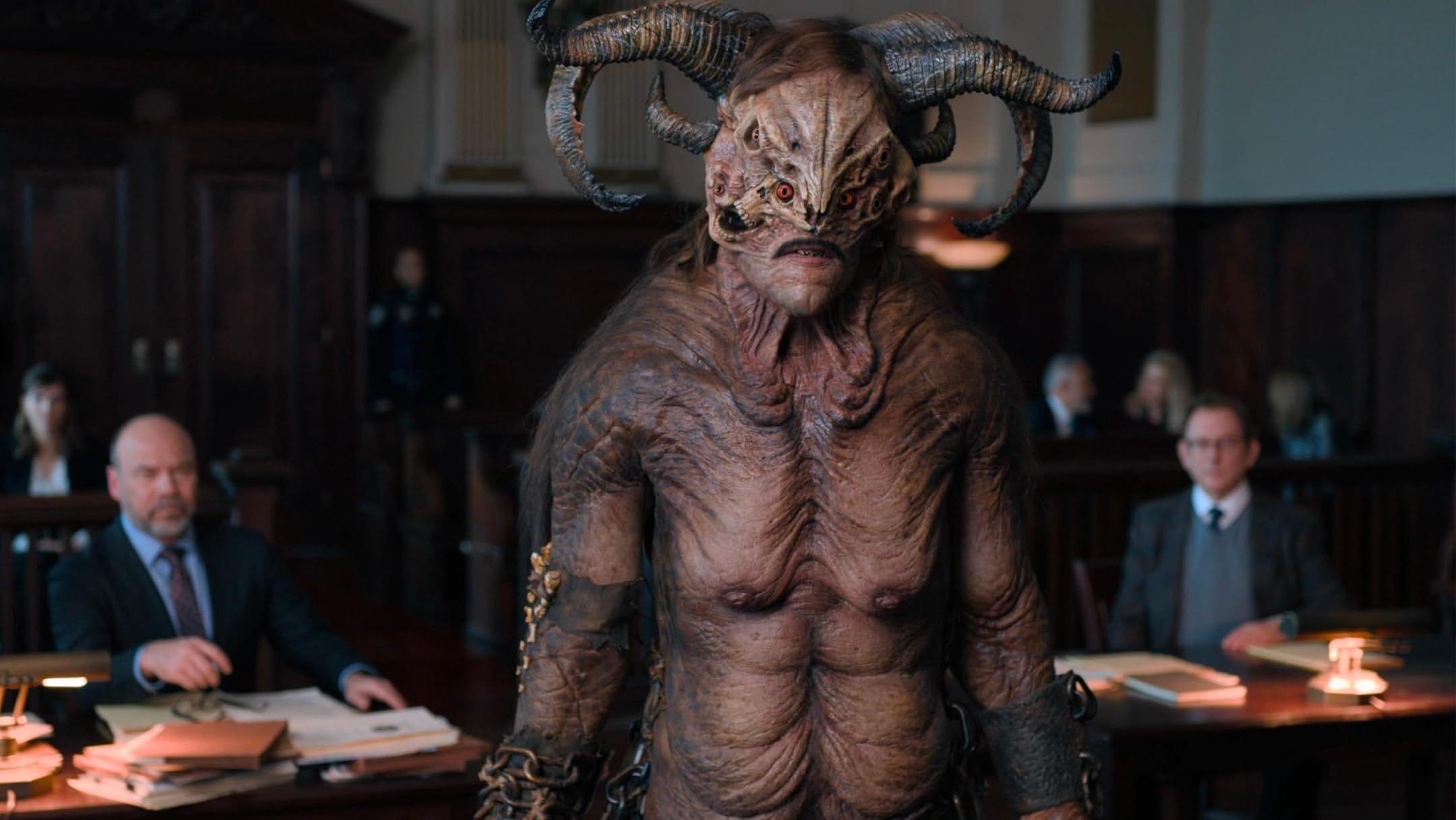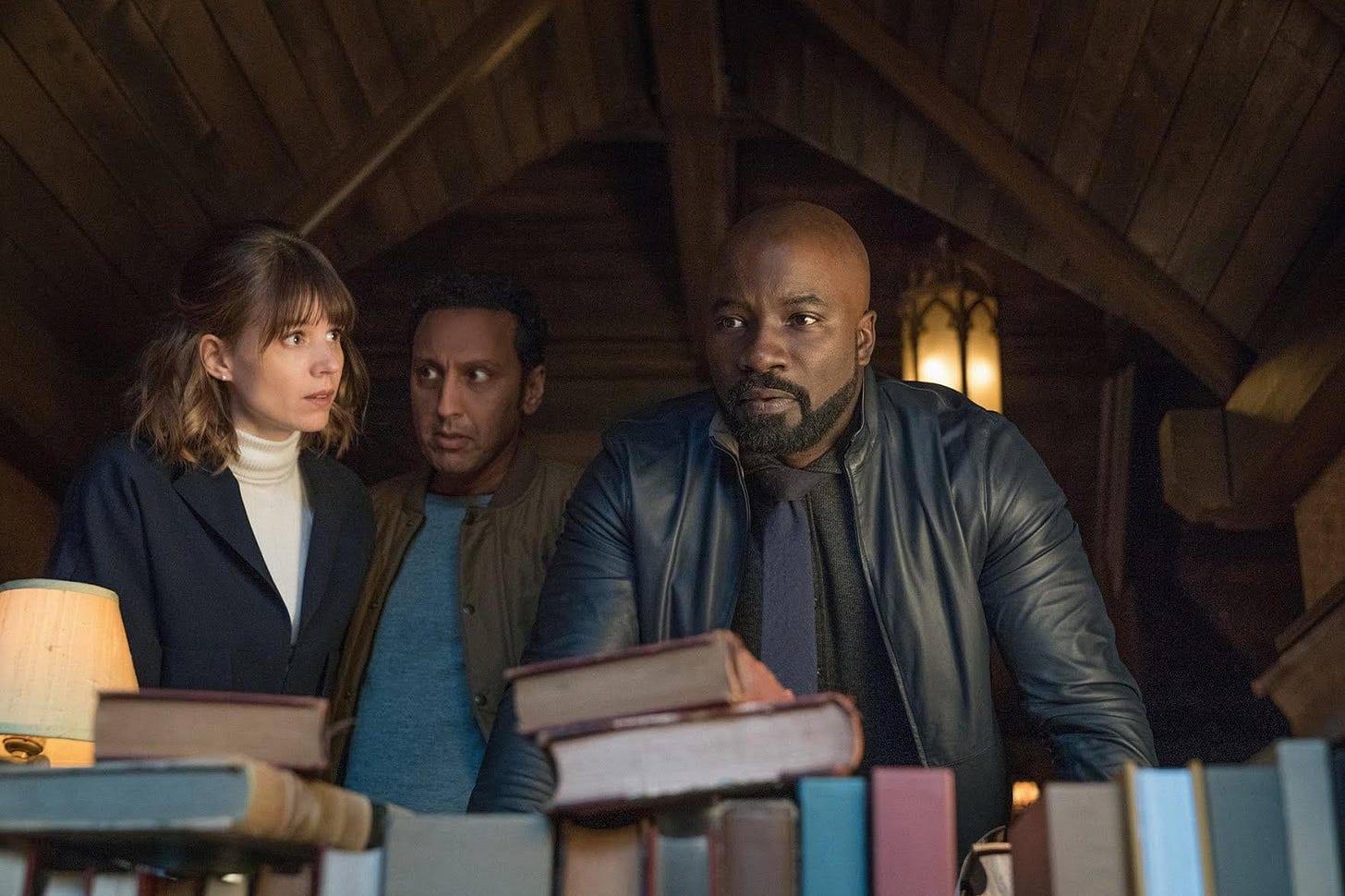‘Evil’ Comes to an End
Bidding adieu to the In-X-Celsis-Deo Files.

THE FIRST THREE SEASONS OF EVIL were inventive, entertaining, and devilishly fun, which makes it all the more disappointing that its fourth and final season ended with a whimper and not a demonic howl. Even though the acting and production design remained consistently excellent, the show’s captivating tension, compelling characters, and intricate plotlines fizzled in the end.
A priest, a forensic psychologist, and a tech specialist (no, this isn’t the setup to a joke) are Evil’s protagonists. David Acosta, Dr. Kristen Bouchard, and Ben Shakir (Mike Colter, Katja Herbers, and Aasif Mandvi, respectively) are contracted by the Catholic Church to investigate whether cases of demonic possession are real, fraudulent, or have scientific explanations; think the In X-Celsis Deo-Files. Created by husband and wife team Robert and Michelle King (who also created The Good Wife and its spinoff, The Good Fight), each episode of Evil examines a new, discrete case while also delving into the main characters’ personal lives, the developing relationship among them, and the machinations of the series’ supervillain, Leland Townsend (Michael Emerson), another forensic psychologist who has diabolical global domination via cyberspace on his bucket list.
Evil’s writers masterfully blended horror with humor, the supernatural with the every day, science with religion, and heart with smarts. Even though David, Kristen, and Ben dealt with increasingly bizarre situations, their characters rang true to life. The interpersonal relationships are touching and complex and kept Evil plausible despite its paranormal underpinnings. We feel Kristen and David’s deep but forbidden love for each other. We see David struggle with his religious faith, Ben with his scientific skepticism, and Kristen with her moral code. We relate to Kristen’s knotty relationship with her mom, Sheryl (the always spectacular Christine Lhati), and her horror as she becomes increasingly entangled with Leland. We are repelled by Leland’s motivations, but recognize his perverted intelligence and twisted sense of humor thanks to Michael Emerson’s bravura performance. And we sympathize with Kristen and Ben’s insistence on explaining away incomprehensible occurrences with rational, scientific explanations. In the Age of Trump, where there is no bottom, desperately hoping that common sense, heart, and justice win over irrationality, hatred, and chaos makes complete sense to me.
As with every show the Kings produce, Evil is a class act. The casting is impeccable: From series regulars to guest stars to even one-line roles, everyone was top-notch. The Kings took full advantage of filming in New York City by populating the show with brilliant New York theater actors (John Glover, Brian Stokes Mitchell, Jeremy Shamos, Jayne Houdyshell, Brian D’Arcy James, Patrick Breen, and Denis O’Hare, to name just a few). These actors have real faces full of character and know implicitly how to play a scene with integrity and theatrical awareness, which is crucial in horror where the stakes are so heightened.
Evil’s production design also has a theatrical flair. Sharp angles of light at night create deep shadows where terrifying creatures can lurk. The camera often gazes up, sometimes making the audience feel small and powerless, and sometimes directing our eyes heavenward, as one looks up at a stained-glass window in a cathedral.
Kristen lives in a crowded two-bedroom house in Queens with her four daughters and a peripatetic mountain-climbing husband. The living room ceiling decorated with cut-out stars is undoubtedly a shared mother-daughter crafting project. The house is cluttered and redolent of happy chaos, full of life. However, it sits under an elevated train line so when trains pass, their rattling and reverberations shake the home and everyone inside, presaging something dark that might befall this family. In contrast, Leland’s grand Park Avenue apartment is luxurious but cold. It’s a place designed to impress and intimidate, to signal the wealth, sophistication and power of its owner (and to keep hidden his former life as an insurance adjuster in Des Moines).
THROUGH THE FIRST THREE SEASONS, the Kings blended horror and humor seamlessly and elegantly. The scares were genuine, but so were the laughs. The various Satanic ambassadors who haunt, taunt, and wreak havoc on characters’ lives have real verve for their jobs, and they play their nihilistic humor to the hilt. The writers often give these fantastical creatures human, ordinary names, like George, Norm, and Abbey, while giving the main ghouls in charge no name. For example, the demon tasked with bringing about the emergence of Satan into the world is named the “Manager.” The show treats the Apocalypse as an end-of-year item to be ticked off a corporate to-do list. In fact, the Manager works for a company called DF (“Dark Father”), with a board made up of demons disguised as white, middle-aged, besuited businessmen. When Sheryl joins DF, working for the Devil is less upsetting than realizing she has no chance of ever advancing in the company, and neither does any other woman in the office. Over her desk, there is a literal glass ceiling. Evil makes the perfect dark observation: In Satanism as in the supposedly beatific entity of the Catholic Church, women are similarly thwarted by the patriarchy.
Evil handled weighty subject matter with dexterity, sensitivity, and smarts. As befitting its title, the show explores the concept of evil in its various forms: racism, misogyny, sociopathy, genocide, man-made environmental collapse, soulless tech overlords exploiting the vulnerabilities of their consumers, the rage of lonely online incels, capitalist greed, cannibalism, and even the sins of the Catholic Church (a brave move considering the Kings are devout Catholics). It consistently takes chances, defies expectations, and produces real pathos and terror. It was appointment television for me and my 16-year-old, and several times we both responded out loud to its cliffhanger endings with an appreciative “Whoa. . .”
Sadly, despite a couple of excellent episodes (“How to Survive a Storm” and “How to Dance in Three Easy Steps”), Evil lost its way in its final season. It becomes occasionally melodramatic and plodding, focusing more on the protagonists’ emotional dilemmas and less on adventurous horror. Perhaps it had to do too much in too short a time, given the unfortunate cancelation notice. But beloved characters are dropped unceremoniously, there are gaping plot holes, and unnecessary storylines are added that make the last four episodes muddled and unsatisfying. Spoilers, and complaints, ahead: Kristen gets over Andy’s betrayal with unnatural speed. After the cliffhanger at the end of season two, nothing happens between her and David, a missed opportunity. What happens to Ben’s migraines and Jinn apparitions when he removes his tinfoil hat? Why is Dr. Boggs surprised to see demons with Sheryl when he invited them into his life to cure his earlier writers’ block? What happened to Lexis’s tail and potential demon status from season one? The show became a tad too religiously tinged for my taste, and there are many red herrings. They abandon the wonderful trope of having a grim pop-up book introducing the demonic dilemma of each episode. They even truncated Evil’s brilliant theme song by David Buckley, which takes away from the music’s dramatic crescendo and so the resolve in its final flourish is less satisfying. This sums up how I feel about the fourth season in general. Instead of offering closure, Evil’s finale felt artificial and pat.
Still, three brilliant seasons out of four is an embarrassment of riches, and I appreciate Evil’s nerve, style, and moxie. The show pushed the boundaries of what psychological horror could be on network television (though the show migrated from CBS to Paramount+ after the first season). It counterbalanced serious social issues with wit, and thrived in the expert pacing of its directors and its cast. How do we find hope when despair seems to be closing in around us? How do we navigate a world where technology and dark forces are so intricately entwined; where evil lurks in the iCloud? According to Evil, you hire a priest, a psychologist and a technology specialist to save you, and in the process, they save themselves, too! Despite my disappointment that the finale didn’t stick the landing, Evil manages an impressive balancing act: science, faith, and technology can work in harmony to solve terrifying mysteries while showing its audience a sinfully good time.




